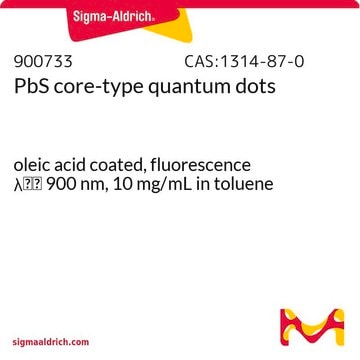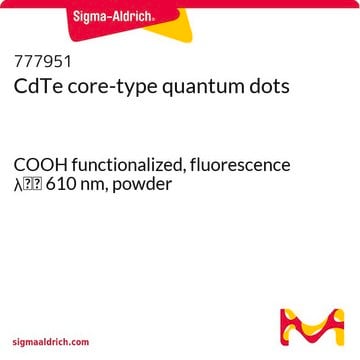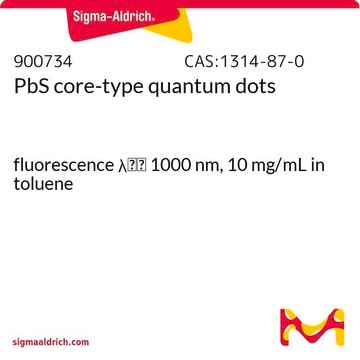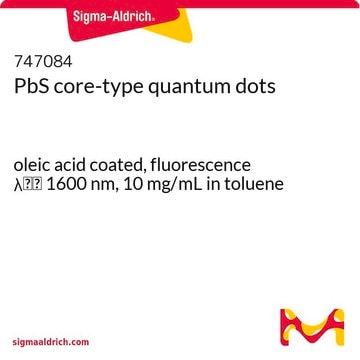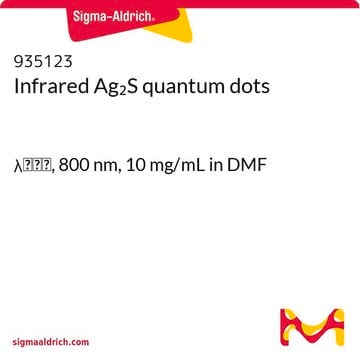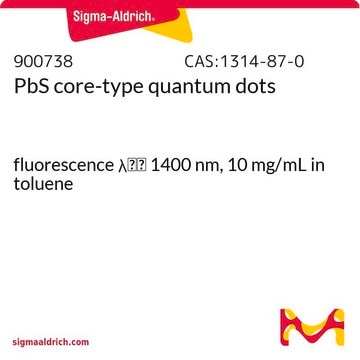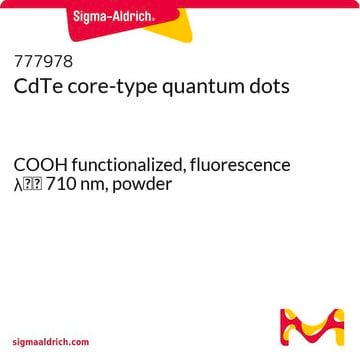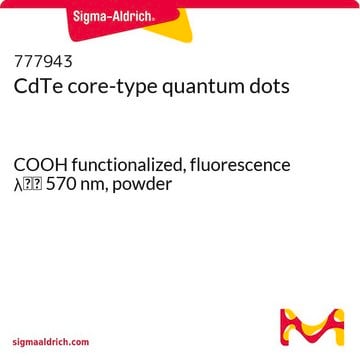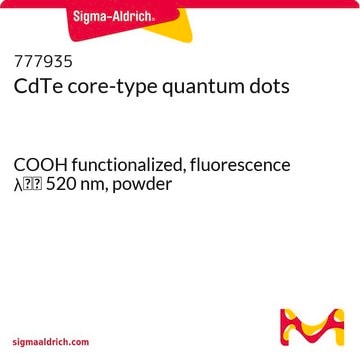747017
PbS core-type quantum dots
oleic acid coated, fluorescence λem 1000 nm, 10 mg/mL in toluene
Synonym(s):
CANdot®, Fluorescent nanocrystals, QDs, artificial atoms
Sign Into View Organizational & Contract Pricing
All Photos(1)
About This Item
Empirical Formula (Hill Notation):
PbS
Molecular Weight:
239.27
UNSPSC Code:
26111700
NACRES:
NA.23
Recommended Products
Looking for similar products? Visit Product Comparison Guide
Related Categories
Application
Our PbS quantum dots have a fully crystalline inorganic core and are organically stabilized with an oleic acid coating, which makes their surface hydrophobic in nature. They exhibit high colloidal and thermal stability, as well as strong emissions with narrow fluorescence bands, owing to their small particle size distributions. These particles absorb all light in the UV, VIS and NIR, up to 900 nm. Their size-dependent absorption and emission properties make them suitable for different applications: such as, absorber materials in photovoltaics, detectors and photodiodes, and phosphors in IR-emitters (solid state lighting, SSL), among many others.
Legal Information
Fraunhofer CAN is a research division of the Fraunhofer IAP
CANdot is a registered trademark of Fraunhofer CAN
Signal Word
Danger
Hazard Statements
Precautionary Statements
Hazard Classifications
Aquatic Chronic 3 - Asp. Tox. 1 - Flam. Liq. 2 - Repr. 1A - Skin Irrit. 2 - STOT RE 2 - STOT RE 2 Inhalation - STOT SE 3
Target Organs
Central nervous system
Storage Class Code
3 - Flammable liquids
WGK
WGK 3
Flash Point(F)
39.2 °F - closed cup
Flash Point(C)
4 °C - closed cup
Choose from one of the most recent versions:
Already Own This Product?
Find documentation for the products that you have recently purchased in the Document Library.
Customers Also Viewed
Randy J Ellingson et al.
Nano letters, 5(5), 865-871 (2005-05-12)
We report ultra-efficient multiple exciton generation (MEG) for single photon absorption in colloidal PbSe and PbS quantum dots (QDs). We employ transient absorption spectroscopy and present measurement data acquired for both intraband as well as interband probe energies. Quantum yields
Decoration of PbS nanoparticles on Al-doped ZnO nanorod array thin film with hydrogen treatment as a photoelectrode for solar water splitting
Hsu, C.-H.;
J. Alloy Compounds, 554, 45-50 (2013)
Steven A McDonald et al.
Nature materials, 4(2), 138-142 (2005-01-11)
In contrast to traditional semiconductors, conjugated polymers provide ease of processing, low cost, physical flexibility and large area coverage. These active optoelectronic materials produce and harvest light efficiently in the visible spectrum. The same functions are required in the infrared
CdS and PbS quantum dots co-sensitized TiO2 nanorod arrays with improved performance for solar cells application
Jiao, J.;
Materials Science in Semiconductor Processing, 16(2), 435-440 (2013)
Our team of scientists has experience in all areas of research including Life Science, Material Science, Chemical Synthesis, Chromatography, Analytical and many others.
Contact Technical Service